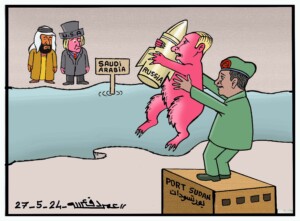Sudan sit-ins grow, so does scepticism around military withdrawal
The number of sit-ins demanding the overthrow of the military coup regime expanded widely in Khartoum and its twin cities. Activists began a sit-in at El Rousi station in Omdurman’s El Fitihab area yesterday, bringing the number of sit-ins in the capital to six. Other Sudanese cities are following swiftly.
 Anti-coup sit-in in Sennar (social media)
Anti-coup sit-in in Sennar (social media)
The number of sit-ins demanding the overthrow of the military coup regime expanded widely in Khartoum and its twin cities. Activists began a sit-in at El Rousi station in Omdurman’s El Fitihab area yesterday, bringing the number of sit-ins in the capital to six. Other Sudanese cities are following swiftly.
The five other sit-ins – two in front of the El Jawda Hospital in Ed Deyoum El Shargiya and in El Rumeila in Khartoum, one in El Muassasa in Khartoum North (Bahri), and two near the house of Ismail El Azhari* and in El Arbaeen Street in Omdurman – continued yesterday.
Resistance committees in Wad Madani, capital of El Gezira, announced earlier that they will start a sit-in today. In Sennar, a sit-in is also taking place and it looks like more cities are joining in.
Following the June 30 anti-junta Marches of the Millions that witnessed a huge turnout in more than 40 Sudanese cities and towns, activists in greater Khartoum set up these sit-ins to call for democracy and the overthrow of the military junta.
Yesterday evening it seemed like the security forces were going to disperse the sit-ins in Khartoum state simultaneously. However, the participants of the sit-in in front of the El Jawda Hospital and El Rousi station withdrew before the forces reached them and returned again after they had left.
In a statement published yesterday, the Khartoum North (Bahri) Neighbourhood Committees reported on a plan to disperse the sit-in of El Muassasa and called on all revolutionaries to come to the sit-in area, to monitor defend all the sit-in’s outer edges, and to install video cameras to monitor the actions of security forces and record any human rights violations during a possible dispersal.
Throttling power
In an interview in Radio Dabanga’s Sudan Today programme, spokesperson for the Omdurman Resistance Committees Mohamed Taher said that the sit-ins aim to limit and control the authorities’ powers after the increased repression of anti-coup demonstrations.
He added that the sit-ins also aim to manage discussions among the demonstrators in order to continue the mass-movement of June 30 protests, which were the biggest since the October 25 military coup but were violently repressed.
Taher emphasised that the sit-ins will remain in place until the coup regime is overthrown, although he could not rule out the possibility that peaceful sit-ins would be dissolved by the authorities but stressed that the resistance committees will take the necessary measures to avoid this scenario.

(Bahri Neighbourhood Committees)
Central Security Room
The Emergency Lawyers warned the authorities against any attempt to break up the sit-ins in Khartoum yesterday.
Rehab Abdallah, member of the Emergency Lawyers, told Radio Dabanga that they support the idea of sit-ins leading to the overthrow of the coup.
In the past days, the Emergency Lawyers formed a special central room to follow up on the sit-ins and monitor human rights violations.
Support for the sit-ins and barricades
The Forces for Freedom and Change-Central Council (FFC-CC) reiterated their support for sit-ins at public squares yesterday and stressed the need for tight coordination between all forces of the revolution to establish a united civil front to overthrow the coup.
On Saturday, the group already said that they “stand with the street movement, the protest marches and sit-ins” and stressed that “the rumours about an 80 percent agreement” with the military are incorrect. “We did and do not communicate with [those responsible for] the coup d’état. There is no political process possible with all this killing”.
'There is no political process possible with all this killing' – FFC-CC
In a statement yesterday, the mainstream FFC-CC called for continuous presence in neighbourhoods and roads, taking into account the daily needs of the people.
The opposition group stressed the need to organise specific strikes and to escalate preparations to reach mass civil disobedience and a comprehensive political strike as soon as possible through unified coordination between the revolutionary forces. They also called for extensive campaigns for the release of detainees.
It is noteworthy that the Forces of Freedom and Change sent letters to all the Resistance Committees in the country to collaborate on establishing a 'united civil front'.
Diversity of resistance tools
The Communist Party of Sudan also announced its support for the sit-ins in Khartoum and considered them a diversification of the tools of peaceful resistance to reach a comprehensive political strike and mass civil disobedience.
The party called on the Sudanese to join or set up sit-ins to form “centres of resistance and daily revolutionary action” across the country.
Military withdrawal
Yesterday evening, Chairman of the Sovereignty Council and Commander-in-Chief of the Sudan Armed Forces (SAF) Gen Abdelfattah El Burhan, announced that the military will no longer participate in the current national negotiations facilitated by the AU-IGAD-UNITAMS Trilateral Mechanism.
A High Council of the Armed Forces will be formed by commanders from the SAF and from the Rapid Support Forces (RSF) which is commanded by Deputy-Chairman of the Sovereignty Council Mohamed Hamdan ‘Hemeti’ Dagalo, “to assume the supreme command of the regular forces and be responsible for security and defence tasks, and related responsibilities, provided that its tasks are completed in agreement with the government that is formed”.
Both El Burhan and Hemeti are responsible for the October 2021 military coup.
On social media, the reactions by activists are sceptical. “El Burhan’s speech is a testimony to mounting popular pressure but in substance it’s simply the snake changing its skin. While pretending to exit politics, the army is creating a defence council of SAF and RSF controlling the coercive power of the state with no civilian oversight”, one wrote.
Another reiterated this point, stating that “El Burhan’s speech is evidence of the success of the revolutionary escalation and shows that he knows that the military cannot rule directly, but what he proposed does not suffice. The proposed security council that will lead the armed forces is made up of the army and RSF and is not subject to any civil authority. And most importantly, it is not possible to accept any scenario that keeps El Burhan and Hemeti in any position of power without accountability”.
'It is not possible to accept any scenario that keeps El Burhan and Hemeti in any position of power without accountability' – social media activist
Someone else also stressed that “his [El Burhan’s] council, which proposed to establish an authority parallel to the civilian government, and his claim to withdraw from the political scene are nothing but misleading. We must all continue our escalation through peaceful resistance and unite the revolutionary forces”.
“The military want to buy time by showing the international community that the Sudanese civilian opposition is not united”, another stressed whilst someone explained that “the military only want to protect their properties”.
* Ismail El Azhari was the first Prime Minister of Sudan (1954- 1956) and elected President of Sudan between 1965 and 1969.











 and then
and then